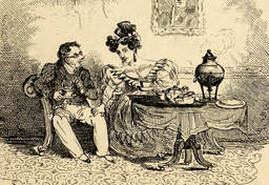| “The reader fond of unravelling plots may gratify his—or her—curiousity at some old-fashioned, superseded circulating library, where Fanny Fitz York may yet be consulted…” -- Richard Wright Proctor, Memorials of Bygone Manchester, 1880 |
 Outspoken widows
Outspoken widows Richard Wright Proctor, quoted above, described Ann Ryley's writing style as "engaging." I agree; in fact, I find Ryley's style more engaging than the actual plot of Fanny Fitz York, which abounds with the usual amazing coincidences which you find in novels of this sort.
Mostly, though, I am amazed at Ryley's outspoken radical opinions, which Proctor does not mention.
Proctor is the only person I've found who discussed Fanny Fitz York, but that was half-a-century after it was published. It received no book reviews when it came out in 1818. I think Ryley's novel deserves some scholarly attention, particularly from academics who tell us that women novelists of this era were constrained from giving their opinions because of the social and political climate of the times. In the previous post, I shared some of the opinions of the heroine and her mother around the sexual double-standard and the harsh penalties society meted out to fallen women. But there's still more, much more, to be shared about Ryley's political views.
The most spirited character in Fanny Fitz York is the wealthy widow Mrs. Bloomfield. Ryley's portrait of Mrs. Bloomfield demonstrates that--the patriarchy aside--widows with money had quite a bit of freedom and could say and do what they pleased. Escorted by her driver, groom, and footman, a widow can travel freely, like Mrs. Jennings in Sense & Sensibility. In Fanny Fitz York, Mrs. Bloomfield shows up unannounced and uninvited at other people's homes and proceeds to make sarcastic remarks about the other guests. However, nothing bad happens to Mrs. Bloomfield as a consequence of her unbridled tongue; her age and wealth protect her. The people she castigates are "types," such as fops and people who are noisy at the theatre--people who are put in the novel on purpose to be satirized. Mrs. Bloomfield is a comic character, but not a villain or a rogue.
True, there is a bit of a disclaimer directed to young ladies. Lady Anne's old friend Mr. Strictland observes that she is "more feared than loved," and that "satire is a dangerous, an unfeminine talent" which he advises the young heroine to avoid. Nevertheless, I think Mrs. Bloomfield is basically a device for Ann Ryley to share her own political views. And she is unabashedly against the Tory government and very critical of the Prince Regent. Have you been told that Jane Austen was a radical but could not share her views openly? Check this out:

In Fanny Fitz York, Mrs. Bloomfield is vehemently opposed to the long-running war against Napoleon. The equivalent in a contemporary novel would be if one of the characters kept making long speeches unrelated to the plot condemning neo-con foreign policy and the way it exploded the national debt.
“The once-flourishing merchant or manufacturer is become bankrupt," Mrs. Bloomfield proclaims, "the shopkeeper looks in vain for his former customers; those who used to expend liberally, are, by the complexion of the times, obliged to limit their out-goings; and the poor are rising en masse for want of the commonest necessaries of life.
"These crying evils are produced by a war, in which we have no real interest, and burthens under which we groan, to pamper those who were before gorged; or to raise people from obscurity, who have neither private virtue nor public desert. But they allied to men in power, are placed upon the pension list, as an easy way of providing for poor relations without considering that every such pension adds to the load of those already sinking under the pressure of poverty.
"Do away all sinecures, and places filled by proxy—pension none but those who have substantial claims upon their country—and there would be no real cause for murmurings; but to know that the earnings of the poor are lavished upon the idle and the indolent—upon the drones in the hive of industry—who can wonder that complainings are heard in our streets, and that curses, not loud, but deep! follow the footsteps of our rulers!”

Okay, so Mrs. Bloomfield says Britain has no real interest in fighting Napoleon and the poor are on the verge of rising up. All right. But I really sat up and took notice when Mrs. Bloomfield rushed into the drawing room and exclaimed:
“He’s shot in the House of Commons!....
“Shot! Who?”
“Percival,” replied the widow. “Killed by an assassin!” Mrs. Bloomfield is referring to the real-life assassination of Prime Minister Spencer Perceval on May 11, 1812.
Then she adds, “Had I guided his hand, the pistol should have been pointed elsewhere----"
Wait, what? Whoa! I don't think Mrs. Bloomfield is saying she would point the pistol in the air so it would discharge harmlessly and not kill the prime minister. She is saying that if it were up to her, some other political figure (maybe Castlereagh, but who knows) would be assassinated. Or... do you think she means the Prince Regent? Holy snapping turtles. Outspoken enough for you?
Just, wow. Okay, to resume the dialogue:
"'Had I guided his hand, the pistol should have been pointed elsewhere--but that between ourselves. What effect his death will have on the body politic I know not, but… we cannot change for the worse…”
Mrs. Bloomfield goes on to acknowledge Spencer Perceval's personal virtues and that he cared about his country. But his policies have led to “an impoverished revenue—a starving people—and the misery of thousands of individuals, who deplore the loss of husbands—fathers—brothers—and friends in this unjust, unnecessary, and destructive war. The most vicious character in existence could not have been a greater enemy to his King, his country, and his fellow citizens, than this reputed good man…”
Then she goes on to criticize the late William Pitt the younger: “Pitt, for instance, you’ll say was an honest man. He was so far honest that he would neither rob a church, nor cheat his tradesmen; but he took the money out of the pockets of the industrious to carry on unnecessary wars, and to subsidize powers, who laughed at our credulity…" She goes on in this vein for several pages until someone else rushes into the room with an actual plot point and the action resumes.
 Robert Southey (1774 – 1843)
Robert Southey (1774 – 1843) These anti-Tory diatribes have nothing to do with the plot, and in fact, I don't think Mrs. Bloomfield even plays a role in the plot in the way, say, that Mrs. Jennings does in Sense & Sensibility. She's there to act as a mouthpiece for Ann Ryley. Nobody else in the novel contradicts her, once she gets going.
I got to wondering about Sherwood, Neely, and Jones, the publishers of this novel, because they ultimately are responsible for the decision to print a novel with so much outspoken political material in it. Their chief claim to fame is that they published the earliest account of Parkinson's disease by Dr. Parkinson himself. But there is another episode in the history of this firm that sheds some light on their political views.
In 1813, the poet Robert Southey was appointed poet laureate, a sinecure that called for him to compose the occasional ode to the Royal family. In his youth, Southey--in common with other many literary figures--had been inspired by the French Revolution and the promise of reform, but his political views changed over time and he came to appreciate the stability of England's institutions. Southey's old radical friends regarded him as a sell-out.
In early 1817, Sherwood, Neely, and Jones brought out Wat Tyler, a verse drama about the leader of the 1381 Peasant's Revolt. The author of the poem was not given on the title-page but people who knew Southey recognized the poem as something he had written back in his radical days. He had shopped the manuscript around 23 years earlier and somehow Sherwood, Neely, and Jones had gotten their hands on it. Other publishers also printed it, as historian Stephen Basdeo explains: "[Southey] never registered the poem with the official Stationers back in 1794, [so] the work was technically out-of-copyright."
British radicals used Wat Tyler to poke the government in the eye by confronting them with the views of their own poet laureate.
 Celebrity Evolution: from Commie to Cannes
Celebrity Evolution: from Commie to Cannes I don't see any record that the government took official action against Sherwood, Neely, and Jones for publishing Wat Tyler. Fanny Fitz York, with its anti-war diatribes and anti-Royalist sentiment, came out at the end of 1817 and I haven't found a record of an official--or unofficial--reaction. Yet in its pages, we have a female character saying that the only thing wrong with the assassination of Spencer Perceval is that the assassin picked the wrong target.
I can only say that Fanny Fitz York provides an example of an outspoken female author making her political opinions clear, and neither she nor her publisher were officially punished.
And we're still not done! Hang on for more Mrs. Bloomfield...
| After Napoleon escaped from Elba in March, 1815, and re-took the French throne, not everybody agreed that it was England's job to use its army to re-install the Bourbon royal family. Ann Ryley was certainly opposed to the high cost and the death toll of the war against Napoleon, and so were the radicals of Manchester, which tells you where Ryley stood on the political spectrum.
Richardson, Megan. 2015. “Authors and Their 'Mischievous' Books: The Salutary Experience of Southey v Sherwood.” Authorship (Gent) 4 (1). |

 RSS Feed
RSS Feed